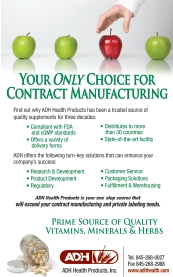As with all types of high-profile public misfortune, a Federal Trade Commission (FTC) investigation is something many natural products companies may think can only happen to other firms. Indeed, it is often the so-called “bad players” or obvious cases of false advertising that gain notoriety when enforcement actions are taken. But even well-intentioned companies may run afoul of FTC if they aren’t careful about the content of their advertising. While much remains the same in this arena, there are several new enforcement patterns to be aware of, as well as several forces to keep tabs on that may well shape the agency’s actions in the near future.
You Still Can’t Do That…
Again and again, FTC has made clear through its declarations and actions that there are some things that simply will not be tolerated in terms of dietary supplement advertising claims. FTC enforcement has long focused on claims of rapid weight loss, along with supposed “miracle cures,” according to Marc Ullman, partner in Ullman, Shapiro & Ullman, LLP, New York, NY and chairman of the Legal Advisory Council of the Natural Products Foundation (NPF), Washington, D.C. “The commission has made it clear that it is of the opinion that without lifestyle changes, no pill is going to cause weight loss, whether it’s a pharmaceutical or a dietary supplement,” says Ullman, whose law firm’s work includes U.S. Food and Drug Administration (FDA) and FTC compliance issues. This work entails helping companies identify product claims that may raise red-flags with regulators, and helping to ensure a proper understanding of the level of scientific substantiation required to make claims.
These types of unlikely claims, whether the company believes they are backed by legitimate evidence or not, tend to invite FTC inquiry, in Ullman’s experience. The faith in some strategies meant to keep FTC at bay, such as disclaimers about “typical results,” or the placement of a footnote about “diet and exercise” in an advertisement with overreaching weight loss claims, may be unfounded. Ullman says the commission has made clear that these inclusions will not deter them from taking a hard look at a misleading advertisement.
“In terms of areas of interest to FTC, it is likely the agency will continue to closely scrutinize weight-loss and immunity-related claims,” concurs Duffy MacKay, vice president of scientific and regulatory affairs at the Council for Responsible Nutrition (CRN), Washington, D.C. To these categories that are frequently subject to FTC attention, he adds products with a significant safety concern, deceptive marketing to vulnerable populations like children or the elderly, and unproven product benefit claims in general.
MacKay emphasizes that FTC inquiries are serious business. Regardless of outcome, he says, responding to them effectively can cost a company more time and money than they might anticipate. The consequences for a brand’s reputation can be longer lasting. FTC, meanwhile, is not the only authority that can cause trouble for a company, as MacKay notes that state attorney generals can initiate investigations into false and misleading advertising as well.
Even unsuspecting companies with established histories of responsible marketing can make a wrong turn if they exaggerate or otherwise misinterpret scientific results, according to MacKay, or if they rely on studies conducted with similar but not identical products. “For example, firms may over-interpret evidence by suggesting that animal and in vitro studies provide enough evidence to claim a product is ‘scientifically validated’ or using the term ‘clinically proven’ when there is only one small unpublished study. These exaggerations may have consequences,” he says.
Whose Jurisdiction Is It Anyway?
In theory, FDA has a separate sphere of both regulatory focus and enforcement capability from that of FTC. In terms of marketing claims and where they’re made, FTC looks at advertising efforts, and FDA sticks to the product label. “FTC is solely focused on whether a company’s claims in marketing materials are substantiated by credible evidence. The main question FTC asks: ‘Is the claim truthful and not misleading?’” says MacKay.
On the FDA side of things, questions of product classification and semantics get addressed. “FDA’s jurisdiction pertains to whether a firm, under the regulations in place, can legally make the claims it is making,” says MacKay. As a common example, he alludes to the use of a term restricted to pharmaceutical drug claims, such as “treat”: this is strictly off limits for dietary supplements, which must turn to specific and well-backed structure/function claims. FDA also examines whether these
science-based claims, the ones that are allowable for supplements, are credible when made directly on the product label. “Companies should be aware that FDA’s enforcement also covers various extensions of the label such as Internet sites, pamphlets and other product material,” MacKay says.
This division of responsibility, however, does not prevent the two agencies from working together on certain cases. “There’s definite inter-agency communication, attempts to make efficient use of resources, and in cases that the agencies both feel are particularly egregious, we have seen from time to time joint enforcement action,” Ullman says.
Watch Out!
At the current time, FTC has its hands full as it typically does with litigation, as well as the usual regulatory enforcement activities on its to-do list. But this won’t stop the agency, according to Ullman, from taking a look at new platforms subject to enforcement, and ratcheting up the attention in others. “Social media is an area where the commission will be paying particular attention,” he says, citing a conversation with an FTC source. The natural products industry may also see a more focused oversight from FTC on product testimonials. “The commission within the past year revised its testimonial and endorsement guide to make it very clear that testimonials have to represent results that the typical consumer can expect,” Ullman says.
As a result of some of the recent high-profile litigation with companies including POM Wonderful, Nestlé and Iovate, consent orders have been put in play that entail heightened scrutiny from FTC regarding future health claims from these companies. “What has caused heartburn in the industry is that these consent orders require two independent randomized controlled trials to support future claims, rather than the flexible standard of ‘reliable and competent scientific evidence’ which is what is required for companies not under consent order,” says MacKay. He goes on to explain that many in the industry are concerned that FTC may move to generalize this standard, making it the de facto requirement for making certain health claims.
This flurry of activity is all contingent upon having the proper funds to follow through, and there is little that is safe or settled when it comes to government agency budgets these days. This is particularly the case for FDA, FTC’s partner agency in ways just described. The fate of its budget is very much up in the air, as lawmakers debate its level of funding going forward, with hundreds of millions perhaps in the balance. FTC, for its part, faces uncertainties similar to other government agencies in the near future. “I think it’s very much in our interest as an industry that both agencies are able to adequately fulfill their enforcement missions,” says Ullman.
In fact, several natural products trade associations and non-profits do their part to work in tandem with FTC and to self-police the industry. “As part of the NPF initiative, our letters to companies that we identify as appearing to be non-compliant mention their obligations both under the Food, Drug, and Cosmetic Act, and the Federal Trade Commission Act, and alert those companies to the possibility of enforcement action by either, or both,” says Ullman. The NPF reaches out to all sectors of the industry in an effort to preempt agency intervention, he adds, stating “We have a pretty good response rate. I’d say we hear from about 60% of companies, with the majority of those attempting to make changes to become compliant.”
CRN has been partnering with and securing funding for the National Advertising Division (NAD) of the Council of Better Business Bureaus since 2006. Within this relationship, the groups work to strengthen consumer confidence in supplement products and promote a level playing field in the industry. The NAD has hired an attorney dedicated solely to assessing dietary supplement marketing claims, and the initiative has been encouraging companies to challenge claims they see as problematic. Since the program started, according to MacKay, over 100 dietary supplement advertising challenges have been completed, often resulting in changes to the claims being made, without FTC intervention.
FTC, for its part, is beginning to engage consumers directly with educational efforts. “The commission has set up a number of consumer education Web sites designed to alert people to what the commission believes they should be watching for,” says Ullman. Responsible industry manufacturers and marketers are striving, in the meantime, to get consumers to notice their products for the right reasons. WF
Published in WholeFoods Magazine, November 2011










